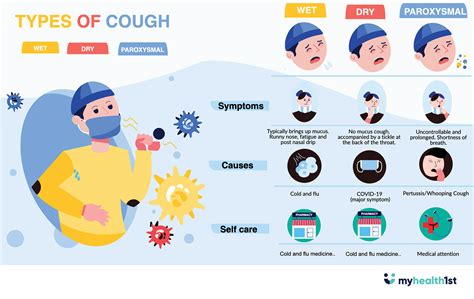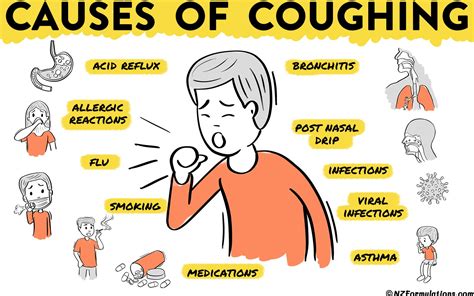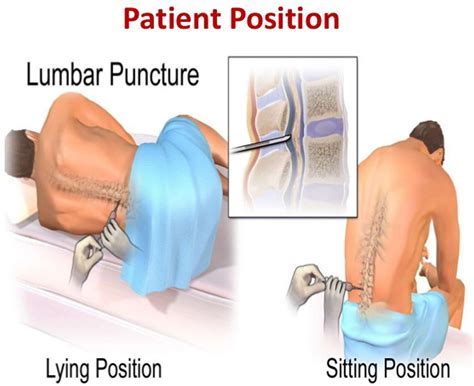Intro
Discover different types of coughs, including dry, wet, and persistent coughs, and learn about their causes, symptoms, and treatments, to help you manage your cough effectively and prevent complications.
Coughing is a natural reflex that helps clear the airways of irritants, such as dust, smoke, and mucus. However, a persistent or recurring cough can be a symptom of an underlying condition, ranging from a minor infection to a chronic disease. Understanding the different types of coughs is crucial for diagnosing and treating the underlying cause. In this article, we will delve into the various types of coughs, their characteristics, and the possible causes.
A cough can be dry and unproductive, or it can produce mucus, phlegm, or even blood. The sound, duration, and timing of a cough can also provide valuable clues about its origin. For instance, a cough that worsens at night may indicate a respiratory infection, while a cough that occurs only during the day may be related to allergies or environmental factors. By recognizing the distinct features of each type of cough, individuals can seek medical attention if necessary and receive proper treatment.
The human body has a complex respiratory system, and coughing is an essential mechanism for maintaining lung health. When the airways detect an irritant, the brain sends a signal to the diaphragm and other muscles to contract, resulting in a cough. This reflex helps expel the irritant, protecting the lungs from damage. However, when a cough persists or becomes severe, it can be a sign of an underlying condition that requires medical attention. In the following sections, we will explore the different types of coughs, their possible causes, and the treatment options available.
Types Of Coughs

There are several types of coughs, each with distinct characteristics. These include dry coughs, wet coughs, productive coughs, and non-productive coughs. A dry cough is a cough that does not produce mucus or phlegm, while a wet cough produces mucus or phlegm. A productive cough is a cough that brings up mucus or phlegm, while a non-productive cough does not. Understanding the differences between these types of coughs can help individuals identify the underlying cause and seek proper treatment.
Dry Coughs
A dry cough is a cough that does not produce mucus or phlegm. This type of cough can be caused by a variety of factors, including allergies, asthma, and environmental irritants. Dry coughs can also be a symptom of a viral infection, such as a cold or flu. In some cases, a dry cough can be a side effect of medication, such as ACE inhibitors, which are used to treat high blood pressure.Causes Of Coughs

The causes of coughs can be diverse, ranging from minor infections to chronic diseases. Some common causes of coughs include respiratory infections, such as bronchitis and pneumonia, as well as allergies and environmental irritants. Gastroesophageal reflux disease (GERD) can also cause coughing, as stomach acid flows up into the esophagus and irritates the throat. In some cases, a cough can be a symptom of a more serious condition, such as lung cancer or heart failure.
Respiratory Infections
Respiratory infections, such as bronchitis and pneumonia, are common causes of coughs. These infections can be caused by bacteria, viruses, or other microorganisms, and can range from mild to severe. Symptoms of respiratory infections may include fever, chills, and shortness of breath, in addition to coughing.Treatment Options

The treatment options for coughs depend on the underlying cause. For minor infections, such as the common cold, treatment may involve rest, hydration, and over-the-counter medications, such as cough suppressants and expectorants. For more serious conditions, such as pneumonia or lung cancer, treatment may involve antibiotics, chemotherapy, or other medications. In some cases, lifestyle changes, such as quitting smoking or avoiding environmental irritants, can help alleviate coughing.
Home Remedies
There are several home remedies that can help alleviate coughing. These include drinking plenty of fluids, such as water and tea, to help thin out mucus and soothe the throat. Honey can also be used to calm a cough, as it has antibacterial and anti-inflammatory properties. In addition, steam inhalation can help loosen mucus and reduce congestion.Prevention

Preventing coughs involves avoiding irritants and maintaining good health. This can include quitting smoking, avoiding secondhand smoke, and staying up-to-date on vaccinations. Practicing good hygiene, such as washing hands frequently, can also help prevent the spread of respiratory infections. In addition, eating a healthy diet and getting regular exercise can help boost the immune system and reduce the risk of illness.
Lifestyle Changes
Making lifestyle changes can help alleviate coughing and prevent future episodes. This can include avoiding environmental irritants, such as pollution and smoke, and staying indoors when air quality is poor. Getting enough sleep and managing stress can also help boost the immune system and reduce inflammation.Complications

In some cases, coughing can lead to complications, such as pneumonia, bronchitis, and sinusitis. These conditions can be serious and require medical attention. In addition, coughing can also lead to rib fractures, lung collapse, and other respiratory problems.
When To Seek Medical Attention
It is essential to seek medical attention if coughing persists or worsens over time. This can include coughing up blood or yellow or green mucus, experiencing shortness of breath or difficulty breathing, or having a fever over 102°F (39°C). In addition, individuals should seek medical attention if they experience chest pain or tightness, or if they have a history of lung disease or other underlying health conditions.Conclusion And Next Steps

In conclusion, understanding the different types of coughs and their underlying causes is crucial for diagnosing and treating the condition. By recognizing the distinct features of each type of cough, individuals can seek medical attention if necessary and receive proper treatment. It is essential to maintain good health, avoid irritants, and practice good hygiene to prevent coughs and reduce the risk of complications. If you are experiencing a persistent or recurring cough, it is essential to consult with a healthcare professional to determine the underlying cause and develop an effective treatment plan.
What are the most common types of coughs?
+The most common types of coughs include dry coughs, wet coughs, productive coughs, and non-productive coughs.
What are the possible causes of coughs?
+The possible causes of coughs include respiratory infections, allergies, environmental irritants, and gastroesophageal reflux disease (GERD).
How can I prevent coughs?
+You can prevent coughs by avoiding irritants, maintaining good health, practicing good hygiene, and getting regular exercise.
We hope this article has provided you with a comprehensive understanding of the different types of coughs and their underlying causes. If you have any further questions or concerns, please do not hesitate to comment below or share this article with others. Remember to consult with a healthcare professional if you are experiencing a persistent or recurring cough to determine the underlying cause and develop an effective treatment plan.
